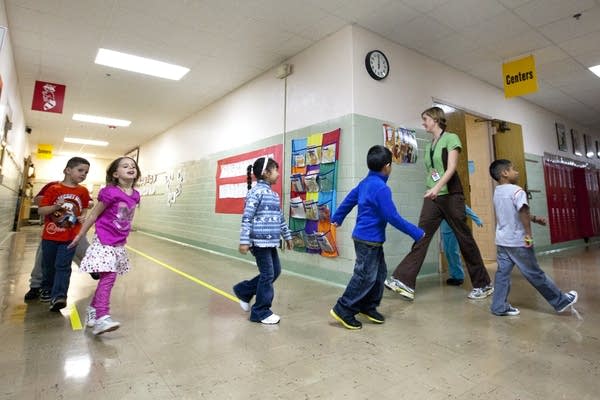Growing quickly, Austin schools expect close vote on expansion
Go Deeper.
Create an account or log in to save stories.
Like this?
Thanks for liking this story! We have added it to a list of your favorite stories.

Of the 126 Minnesota school districts with tax levies on the ballot next Tuesday, none are quite like Austin.
Unlike most districts outside the metropolitan area, Austin is growing, expecting to add 1,000 students in the next decade. It's home to Hormel Foods Corp., a Fortune 500 company, and it has experienced an influx of young Latino families drawn to the meatpacking industry. These are families that tend to have more children than the national average, and Austin's schools are already over their capacity.
So school officials have placed a $29 million question on the ballot. But even though much of the cost would be absorbed because the district has almost finished paying off other debt, school officials are expecting a close vote.
You can see the problem in the gymnasium at the Woodson Kindergarten Center. About 50 boys and girls were in the gym on a day this week, a group of students sitting at one table coloring cornucopias and turkeys and others working separately with a speech teacher.
Turn Up Your Support
MPR News helps you turn down the noise and build shared understanding. Turn up your support for this public resource and keep trusted journalism accessible to all.
The gym is in almost constant use. But there's one thing it can't be used for — an actual gymnasium. There's been a space crunch at the kindergarten center ever since it opened seven years ago. Before that, Austin saw about 250 kindergarteners a year. But all of a sudden in 2004, that number jumped to 350.
"We at first wondered if that was just a fluke that first year and we saw a funny little bubble in our enrollment," said principal Jean McDermott. "However, it has stayed constant and, in fact, this year we've seen an increase even to 400 students."
Districtwide, Austin's student population is projected to grow to about 5,500 over the next decade, 1,000 more than today.
Along with the kindergarten, three of Austin's four elementary schools are over capacity. Next year, the town's only middle school will be, too.
The answer to the space crunch is to expand the kindergarten center and construct a new building for grades 5 and 6, said Mark Stotts, director of finance and operations for the district.
"We're not talking about just shifting around grade levels within our existing buildings," he said. "We're talking about a significant number of students that are going to walk through these doors and we need to find the space for them."
But it's not hard to find resistance to the ballot question either. At the Mower County Senior Center the same day, a hot game of snooker involved eight men clustered around two billiard tables. They all knew about the school referendum and none was planning to vote for the measure, which is estimated to add about $50 to the yearly tax on an average Austin home.
Even Arnold Lang, a former school administrator who moved back to Austin when he retired, said he'll vote no. Lang is worried about the economy.
"Even a little extra tax is going to be an extra burden for a lot of these folks," Lang said. "And so, while I can appreciate the district's concern for more space, I still in all conscience must not be supportive to the referendum."
The levy question will share the ballot with a school board election, but there are no big races to draw voters out to the polls this year. Normally that bodes well for school levy questions.
But in Austin, the dynamics are different. In 2009, another off-year election, voters defeated a school levy here. Seventy percent of Austin's residents have no children or grandchildren in the school system.
Administrators said anti-immigrant sentiment also plays a role in the opposition. Almost 50 percent of Austin's kindergarteners are minority students.
Among the questions school officials are asked, Stotts said, are these:
"How many English-as-a-second language teachers do you have in the district?"
"Are you building the school for 'those kids?"
Stotts has an answer.
"If the students are here, it's our legal and moral obligation to educate those students," he said.
District officials pushing for passage estimate about 3,000 people will show up at the polls and vote 'no,' no matter what. So parents and administrators are working hard to turn out at least that many 'yes votes.
Superintendent David Krenz estimated he's given his presentation on the situation almost 50 times in the past few months.
If the levy fails on Tuesday, the district will look at renting space and increasing class sizes. But Krenz said that won't be good for students.





